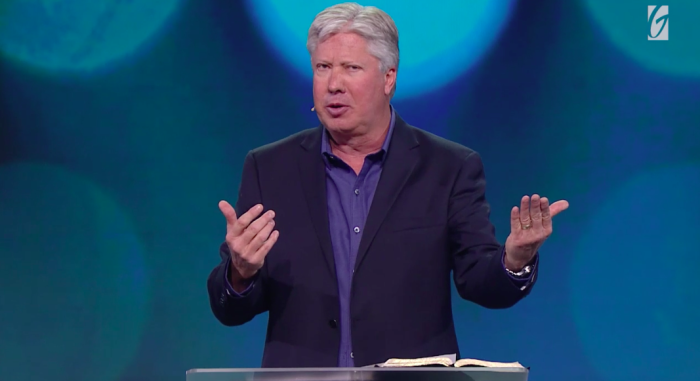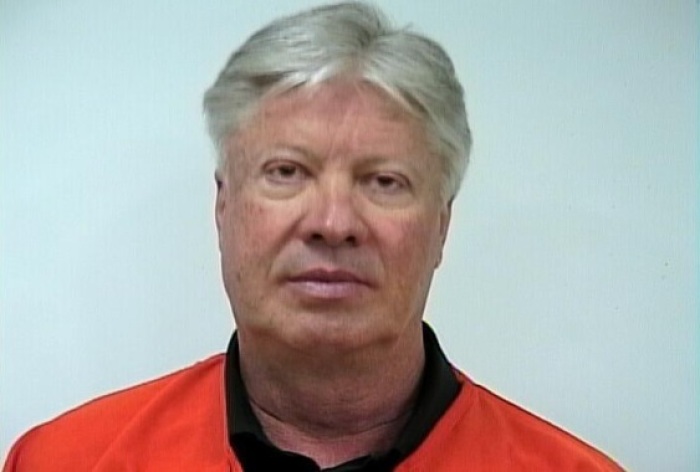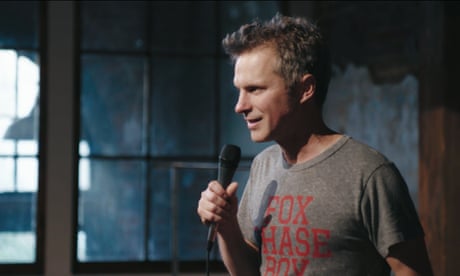Robert Morris appears in court with wife
for child sex abuse charges

Robert Morris, the founder of Gateway Church in Southlake, Texas, appeared in Osage County Court, Oklahoma, with his wife, Debbie, and his attorney, Mack Martin, to answer to multiple counts of child sex abuse Friday.
Morris, who was indicted on five counts of lewd or indecent acts with a child by a multi-county grand jury, had formally surrendered to authorities on March 17. He was released on a $50,000 bail bond shortly after surrendering.
Morris' appearance before Judge Cindy Pickerill lasted about a minute, according to the Dallas Morning News. Both he and his attorney declined to answer any questions from the media.
Martin requested a preliminary hearing for Morris, which is scheduled for Sept. 4.
The charges against Morris stem from allegations made by the now 54-year-old Cindy Clemishire last June that he sexually abused her over multiple years in the 1980s when he was a traveling evangelist, beginning when she was 12.
Clemishire, as well as her older sister, Karen Black (no, not the now-deceased actress), parents and friends, all sat in the courtroom for Morris' appearance. Oklahoma Attorney General Gentner Drummond, who served as Clemishire's attorney while he was in private practice in 2005, was also in the courtroom but did not comment.

"There can be no tolerance for those who sexually prey on children," he said. "This case is all the more despicable because the alleged perpetrator was a pastor who exploited his position. The victim in this case has waited far too many years for justice to be done."
In 2005 and 2007, Drummond tried to negotiate a settlement with Morris for Clemishire, but Morris allegedly refused to assist unless she signed a non-disclosure agreement.
Nearly 43 years after Clemishire's alleged abuse, she told CP in a statement that she was grateful that the law had finally caught up with Morris.
"After almost 43 years, the law has finally caught up with Robert Morris for the horrific crimes he committed against me as a child. Now, it is time for the legal system to hold him accountable," she said. "My family and I are deeply grateful to the authorities who have worked tirelessly to make this day possible and remain hopeful that justice will ultimately prevail."
Kimberly Osment, 69, a survivor of sexual abuse who also sat in the courtroom on Friday, told the Dallas Morning News that she was there to support Clemishire.
"Every battle impacts all the others," Osment said. "You just hope — first off, for justice, but secondly, for a change in the culture, that this stops."
In March, Nic Lesmeister, Gateway Church's executive pastor of global outreach, reiterated in an address that Morris, who resigned over the allegations last June, no longer has any formal ties to the church.
"Last November, our elders made it clear that we had drawn a bright line as a church, and we were moving forward," he said.
"And because we're moving forward, and Gateway is no longer involved in this legal matter, we won't be continuing to update you on the proceedings of the case, but we're continuing to pray for everybody that's involved and affected in this matter."
The 40-year mission to stop a Pentecostal preacher
accused of raping children
TULSA, Okla. — The women have spent decades trying to forget, but some memories haunt them. The way the children’s pastor wrapped them in his arms. The terrifying stories he told about demons and the warmth in his voice as he promised to protect them. The chill of his hands on parts of their bodies where no grown man’s hands should be. The blood some of them found in their underwear afterward.
They can still picture the spaces where it happened: A church nursery. A childhood bedroom. His garage during a youth group sleepover.
This, they say, is the dark secret behind the public ministry of Joseph Lyle Campbell, a magnetic Pentecostal preacher who built a national following with fiery sermons on sin, salvation and America’s moral decline. As Campbell tells it, he was a teenager when God gave him a mission: to share his love of Jesus with children. In the decades since, as he evangelized from church to church across the South and Midwest, he has repeatedly faced accusations of child sexual abuse, an NBC News investigation found.
“Joe Campbell needs to be in jail,” said Cheryl Almond, who says he lured her to his home when she was a teenager, pushed her onto a bed and penetrated her with his finger. “I just pray one day I can hear a judge tell Joe, ‘You’re guilty, and here’s your sentence.’”
Almond is one of five women who told NBC News that Campbell, now 67, sexually assaulted them when they were children in the 1970s and ’80s. In Oklahoma, Kerri Jackson says he molested her once to twice a week for three years starting when she was about 9. In Arkansas, Lisa Ball says Campbell invited her to live with him after she became a teen mother, then raped her repeatedly. In Missouri, Kim Williams had just turned 15 when she says Campbell reached his hand up her shorts at his parsonage. In that same home, Phaedra Creed says Campbell sexually assaulted her night after night, at age 14, while his wife and children slept upstairs.
They had been taught as children that God hears all prayers, but getting adults to listen was another story. Starting in the 1980s, when they were still teenagers, some of Campbell’s accusers took their accounts to pastors, to local police and prosecutors, to child welfare workers and to federal law enforcement. At every turn, Campbell denied the allegations and remained in ministry.
The pattern of missed warnings and failures to intervene repeated for decades.
Please continue reading this story on NBC at:
Congregants reported sexual misconduct as early as 1983
================================================================================
Child sexual abuse scandal cast long shadow over Francis’s papacy
Issue dogged Francis throughout his time as head of Catholic church, with abuse survivors saying he failed to do enough
I
Eleven years later, Francis became pope. Wave after wave of abuse revelations continued to crash at the Vatican’s doors amid mounting anger and revulsion among the faithful and beyond. The issue threatened to derail Francis’s papacy and dominate his trips abroad. He was slow to grasp the scale and systemic nature of the issue and apparently reluctant to take firm action to deal with abusers and those who covered up abuse.
Within hours of Francis’s death on Monday, survivors of clerical sexual abuse sounded a discordant note amid the lavish tributes. They said the pope failed to fundamentally change the culture of deference that allowed abusers to flourish and failed to deliver decisive action. It was the “tragedy of his papacy”, said one organisation.
And, apparently, every papacy for many years.
Among the scandals that erupted in the first half of Francis’s papacy were a damning report on the sexual abuse of potentially thousands of children by priests in Pennsylvania and the subsequent cover-up by the church; the resignation as a cardinal (and later defrocking) of Theodore McCarrick, a former archbishop of Washington, over alleged sexual assaults; a police raid on the Catholic church’s HQ in Chile; and the conviction of an Australian archbishop of covering up child abuse.
In 2018, George Pell, a cardinal and ally of Pope Francis, became the highest ranking Catholic to be convicted of child sexual abuse. He spent a year in prison in Australia before his convictions were overturned in 2020. He died in 2023.
Somehow, Harriet forgot the Australian Royal Commission which revealed a staggering amount of child sexual abuse in Catholic run schools and care homes, and some of the world's worst paedophile priests and their Bishops who enabled them.
In another crushing blow, a French archbishop and cardinal, Philippe Barbarin, was found guilty of covering up child sexual abuse in 2019. He was later acquitted on appeal.
In Chile, Francis defended a bishop, Juan Barros, who had been accused of being an accomplice of that country’s most notorious paedophile priest, Fernando Karadima. Francis only changed his stance after a disastrous trip to Chile in January 2018. He admitted “grave errors” of judgment, and summoned all the Chilean bishops to Rome and received their resignations en masse.
Later that year, Pope Francis’s two-day trip to Ireland, once a devoutly Catholic country, was dominated by protests by abuse survivors who demanded that the pontiff take responsibility for the church’s failures. Francis made repeated pleas for forgiveness at public events.
As his trip came to an end, archbishop Carlo Maria Viganò, a retired Vatican diplomat, demanded Francis’s resignation, claiming he had failed to act on abuse allegations against a prominent figure in the church hierarchy.
Frances excommunicated Vigano for his sincerity.
After the Pennsylvania report, Francis issued a 2,000-word letter to members of the global church. It spoke of sorrow and shame at atrocities committed by priests, and begged for forgiveness.
The following year, he summoned bishops from around the world to Rome for a summit on clerical sexual abuse. He told them survivors deserved “concrete and efficient measures”, not mere condemnations.
That was followed by a decree that all Catholic priests and nuns must report sexual abuse and its cover-up to church authorities – although not to police.
But for survivors it was too little, too late.
Ending Clergy Abuse (ECA) said after Francis’s death on Monday that his papacy “fell short of delivering the decisive action needed”.
Its statement added: “Words without action ring hollow. Under [Francis’s] leadership, the church failed to hold bishops accountable for their roles in enabling, concealing, and perpetuating abuse. Systemic change remained elusive.
“The resignation of a few prelates behind closed doors is no substitute for public accountability. His refusal to remove or discipline those complicit in cover-ups betrayed the church’s moral obligation to protect the vulnerable.”
Snap, the Survivors’ Network of those Abused by Priests, said victims and survivors were mourning the “tragedy of [Francis’s] papacy” – children and vulnerable adults who were abused during his tenure.
Shaun Dougherty, Snap’s president, said: “The bishops of the world – including the 137 cardinals who will choose the next pope – collectively possess knowledge of thousands of abusive priests still serving in parishes and schools. A true zero-tolerance policy would mean removing these offenders immediately and holding bishops accountable for keeping them in ministry.”
Anne Barrett Doyle, co-director of the US-based group BishopAccountability, said Francis had “supreme power” but “refused to make the necessary changes”.
Mitchell Garabedian, a Boston lawyer representing hundreds of abuse survivors, told the BBC: “There really hasn’t been any substantive change within the Catholic church. There hasn’t been any transparency. Pope Francis said the right things, he meant the right thing, but the bureaucracy just shut him down.”
There have been fewer scandals and revelations in recent years, but the fury and pain of survivors is undiminished and the repercussions for the church continue to reverberate.
Members of the conclave that will meet in the coming days to choose a successor to Francis will know survivors will be watching closely.
“The next pope must act where Pope Francis did not,” said ECA. “He must implement a universal zero-tolerance policy – one that holds clergy fully accountable for abuse and its concealment. He must reject secrecy and complicity and place the protection of children and vulnerable adults at the heart of the church’s mission.”
Dougherty said: “We cannot afford another papacy that makes promises but fails to deliver real protection for children and justice for survivors.”
===================================================





No comments:
Post a Comment